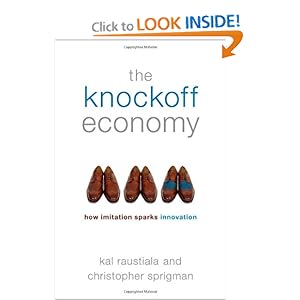 Summary: Fascinating look at creative areas of the economy where copyright and patent law do not apply.
Summary: Fascinating look at creative areas of the economy where copyright and patent law do not apply.
According to the common line of thinking, without copyright and/or patent law there would be no incentive to create. The authors of this books are not completely dismissing this claim.
Instead they are following creative industries where copyright and patent law legally are not applicable. The areas explored are fashion (you cannot copyright a ‘useful object’), food (you cannot copyright a series of instructions), football (theoretically you can copyright choreography but no one has tried to do this in football), open-source software, magic and comedy.
All of the areas are very creative, and all are thriving. The authors look at the way that alternative means are used to reward creativity and limit inappropriate copying.
In each of the areas, there are norms around intellectual property. It may be that people that inappropriately share are shamed by the community, like in comedy or magic. In fashion there is some incentive to want others to copy (to create obsolescence and show that mark that your item is important enough to be copied). In football, the importance is not on preventing copying, but on the immediate next game. So it doesn’t really matter if someone copies, because the next year, you have a different team and that team needs new plays that are based around the strengths of the current players, not the former players.
In all of these areas, it is agreed that even if there were legal protection from copyright or patent, the difficulty in changing the culture or the actual problems defining enforcement means that copyright or patent systems would not work. So while some might wish for stronger legal protection, the actually design of the systems means that they would likely be unworkable.
There is also a very interesting epilogue where the authors explore ways that Music and Movie industry could adapt some of the alternative norms for protecting intellectual property. Their conclusion is that much of the problems are self induced, although localized (it is the recording industry that is in trouble in music, not the music industry as a whole.)
If you work in an area that deals with intellectual property or creativity, this is a fascinating book. Well work looking at how systems can be created to facilitate better intellectual property management, and how sometimes copying actually creates incentives instead of destroying them.
The Knockoff Economy Purchase Links: Hardcover, Kindle Edition
______
A digital copy of the book was provided by the publisher through Netgalley for purposes of review.